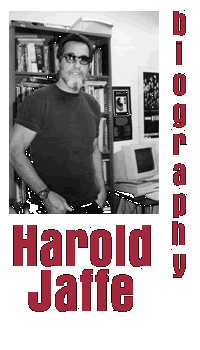
Harold Jaffe interviewed by Jiminy PanozFrom Interview With Harold Jaffe
|
|
Jiminy Panoz: You're very creative and innovative. I must admit you are a source of inspiration to me; I'm trying hard to experiment a lot. How does it all started for you? Harold Jaffe: I recognized as a teenager that much of my life was lived internally -- in my imagination. And moreover, that writing about these imaginings came naturally to me. JP: Your docufictions are selections and treatments of texts such that the reader is incapable of distinguishing between fact and fiction. I must admit it reminds me of John Dos Passos and Hunter S. Thompson. Would I be wrong if I claimed docufiction is a deviated form of Gonzo Literature? HJ: I have a stronger connection to the Dos Passos of USA (later he became an arch-conservative) than to Hunter Thompson and the "gonzo" group. JP: I've almost puked when I read some of your stories; they were so disturbing. You make no compromises, you have no remorse and you're critically acclaimed. How can you explain that? HJ: Actually, I have remorse, but for the people and animals that are overlooked. In 15 Serial Killers and elsewhere I turn the objectified -- criminals, those accounted mad, etc. -- into the subject position so that we can witness them unmediated. As for being critically acclaimed, a portion of that has to do with the prose itself -- the music, rhythms and the unusual formatting. JP: Was anti-twitter meant to prove internet is the last place where you'll find something valuable? What was the basic idea at the core of this project? HJ: The idea was to tease out some of the subtexts that fuel global capitalism. Capitalist entertainment presents something condemnable, such as serial killers or Nazis, but at the same time makes these objects charismatic and consumable. Condemn / Consume is the mantra. My intention in Anti-Twitter, at least in good part, was to illuminate the obscured subtexts, whether they contained racism, xenophobia, lack of compassion, eroticism, jingoism, etc. JP: Tell me more about Paris 60. As french readers, we're allured. HJ: Based in part on Baudelaire's Paris Spleen; I was in Paris in 2008 to promote the translation of 15 Serial Killers and decided to maintain a traveler's journal, which turned out to be a volume that foregrounds aspects of Paris (a city I love, incidentally) that are not presented in conventional travel books. North Africans, Asian-French, clochards, close looks at the red light districts, the triumph of the mobile phone, deviant views of art, the French tradition of the mime, became my subjects. Aside from Paris Spleen, the journal was inspired by an exhibition I saw of Goya's anti-war prints in the Petit Palais. I also paid very close attention to parole, the way French is spoken by various Parisians, including recent immigrants. JP: Counter-culture is strong in the US -- We don't have that in France, really. How could you explain such an appetite for outcasts and outsiders? For instance, Bizarro is something so big that publishers are specialized in this genre. That's something impossible to imagine in the French industry. HJ: This is a bit complicated. Truthfully, I believe that counter culture is stronger in France than in the US. Bizarro is not Bataille, Artaud, Genet, or Pierre Guyotat. It is generally an indulgence in easy sorts of extremity without commentary. JP: Do you consider self-publishing as an alternative in the mid-term? I tried and it was so extinguishing I'm now praising my publisher's partnership. HJ: No. The bleak reality is that reading is fading very rapidly, and the experience of reading a well-produced book has devolved into a competitive form of self-promotion and easy entertainment. JP: It seems Paper declines while e-books sales are dramatically soaring. Have you noticed it personally? HJ: Yes. And it is less a sense of preserving what's left of our forests than ceding to technology, which is viewed as the dominant force, the unmoved mover in global culture. JP: Do you use tablets, smart phones or eReaders in your creative process? HJ: No. I use basic technology. My interest in technology is mostly theoretical, as with Baudrillard or Virilio. JP: Believe me, your books are nearly perfect for enhancements. You could put videos, audio interviews, letters, "confidential documents and mails", and so forth. Docu-fiction, in particular, is perfectly-shaped for this process. But give me your opinion. Do you think it could be useful? After all, I've seen illustrations in 15 Serial Killers... HJ: I would be open to any initiative. JP: You're teaching Literature at San Diego State University. It must be rock and roll to have Harold Jaffe as a literature Teacher, isn't it? HJ: I like to think so. JP: You're also the editor of Fiction International. In a few words, what is Fiction International? HJ: Well, it resembles French journals such as Tel Quel (at least in a few of its incarnations) more than it resembles American journals. Our dual emphases are innovation and progressive (even revolutionary) politics. JP: Who inspires you today? HJ:Artaud, Walter Benjamin, Pierre Guyotat, B. Traven, Clarice Lispector, Pasolini, Godard, Robert Bresson, Agnes Varda, Orlan, Andrei Tarkovsky . . . JP: You have the bottom line. What would it be? HJ: Right vocation. Do what you need to do irrespective of results. |
|
Return to the top of the page.
Copyright © 2001-2013 by Harold Jaffe. All rights reserved.
|